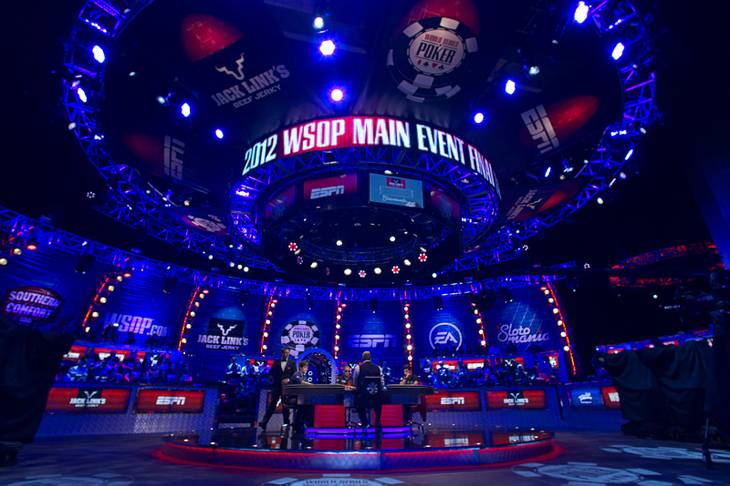For more
When Seth Palansky gets questions about Caesars Interactive rolling out online poker in Nevada, he inevitably mentions patience.
That’s the virtue the company cited when Station Casinos rolled out its Ultimate Poker website last month, becoming the first fully legal real-money gambling program to launch in the United States.
But being first didn’t matter, said Palansky, spokesman for Caesars Interactive.
“There’s got to be a little patience,” he said.
Caesars is now preparing to launch a fully functional WSOP.com during the 44th annual World Series of Poker to perhaps become the second website in Nevada to offer real-money poker tables. And if all goes as planned, WSOP.com will go live before the Main Event on July 6, allowing players to compete in a 10-day online tournament via satellite.
Nevada gaming regulators in 2011 approved a partnership between Caesars Entertainment Corp. and 888 Holdings PLC, a Gibraltar-based company that runs online casinos in the United Kingdom.
It was the first such approval in the history of online gaming in Nevada and one that paved the way for a deal allowing Caesars and 888 to launch gambling websites using Caesars’ famed WSOP brand.
But the seeds of the relationship were sown much earlier.
“The history goes back a few years ago,” said Itai Frieberger, chief operating officer of 888 Holdings.
In late 2009 — when Caesars was known as Harrah’s — the domestic casino giant wanted badly to enter the United Kingdom with its WSOP lineup. Caesars found a conduit into the market when it inked a multimillion-dollar deal with Dragonfish, an 888 Holdings company.
888 Holdings caught Caesars' attention in 2006, when the offshore company pulled out of the United States market, which at the time generated more than $15 billion in revenue.
The exodus followed a bill signed by President George W. Bush that restricted online gaming in the United States. It wasn’t long before Congress prohibited credit card companies from collecting payments made to online gaming sites. Backers of the bill claimed the rule would improve port security.
888 Holdings quickly pulled out of the United States, giving up a huge chunk of the North American market. But other offshore companies stayed, leading to one of the biggest federal crackdowns in United States history in 2011.
That’s when prosecutors indicted operators of some of the world’s largest online gaming websites in a major bust known as “Black Friday.” The Department of Justice shut down the domain names of the largest offshore operators catering to U.S. customers. The bust forced players to go back to brick-and-mortar casinos or risk breaking the law.
Throughout the drama, Caesars remained hard-pressed to get approval to launch an online gaming site in Nevada but maintained its relationship with 888 Holdings. Palansky said the company’s decision to pull out of the United States — one of the most lucrative markets on the planet — helped solidify Caesars’ decision to partner with 888 Holdings, which employs more than 1,600 programmers in several locations around the globe.
“Looking for a partner led to two paths: good software and suitability,” Palansky said. “At the end of the day, 888 was the best fit for us. … America doesn’t have a wealth of people with that experience, and we’ve been very impressed with their level of experience.”
At least 500 of 888 Holdings programmers have spent much of their time in recent years developing the technology behind Caesars’ forthcoming WSOP platform.
“The front end of the poker is just the tip of the iceberg,” Frieberger said. “There’s a lot going on underneath.”
The partnership hasn’t been without challenges. Palansky cited the time difference between Las Vegas and London as a potential challenge and the typical technological kinks that come with launching software.
At a news conference last week, WSOP Executive Director Ty Stewart exploited a recent flaw in Station’s Ultimate Poker brand, referencing a widely shared photo of a glitch on one of Ultimate Poker’s tables. The photo appears to show a flop with two identical cards: the 9 of spades.
But Palansky has been sympathetic — he knows WSOP will have to work out some kinks of its own.
“There’s a lot of newness. I think there’s some convincing that needs to be done,” Palansky said. “It’s like opening a new hotel or restaurant. It’s takes everyone a little time to get going.”
Experts say another challenge may lie in the partnership between Caesars and 888 Holdings, which has signed nonexclusive agreements with two other gaming companies: WMS Gaming and Treasure Island.
Mark Lipparelli, a member of the University of Nevada Foundation’s board of trustees and former member of the Nevada Gaming Control Board, said there’s no telling how online gaming partnerships will shake out.
“The development of the industry is going to present interesting partnership opportunities,” Lipparelli said, “and how these will come together is still in question.”
